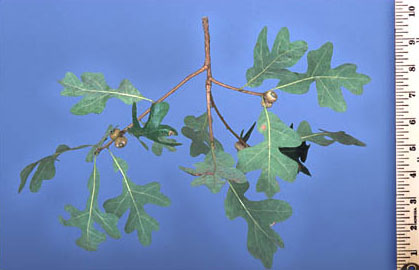Sand Post Oak
Quercus margarettae
Family: Fagaceae
Natural History

Leaves and branch of sand post oak | Photo credit: Larry Korhnak, University of Florida
Sand post oak is a slow growing, drought resistant oak that is well adapted to dry, upland scrub habitats in Florida. It grows from Massachusetts south to central Florida and west into eastern Kansas, Illinois, and Texas.
Sand post oak is late to reproduce and may not produce seeds for the first 20 to 30 years. It is sometimes grown as a shade tree or to stabilize soil along sandy slopes or ridges. This species, along with many of the other oaks, hybridizes easily and often shows much variation in form and leaf shape.
Although durable and moderately to highly resistant to disease, the wood of sand post oak is not considered a good timber. Its slow growth rate and susceptibility to insect damage limit commercial uses. Most sand post oak is harvested for mining timbers, railroad ties, flooring, and siding. The ability of the trees to resist decay, while within soil, has led to their extensive use for fence posts and to the common name of the species.
The bark of sand post oak contains tannins that inhibit insects and make it an ideal landscape mulch. The chipped bark is attractive and will retain moisture and nutrients while reducing insect infestation.
The trees provide valuable resources to numerous wildlife. Cavities within the oaks provide good nesting and denning sites for cavity-nesting birds and various mammals. The foliage is often used in nest building by birds, rodents, and small mammals. The trees also provide shelter, nesting, and perching sites for many songbirds and birds of prey. White-tailed deer, wild turkey, three species of squirrel (gray, fox, and flying), and various rodents all depend on the acorns as a high-energy food source; however, the tannins in the acorns, leaves, and buds are toxic to some domestic livestock, such as goats, cattle, and sheep. Oak poisoning can be fatal to these animals.
